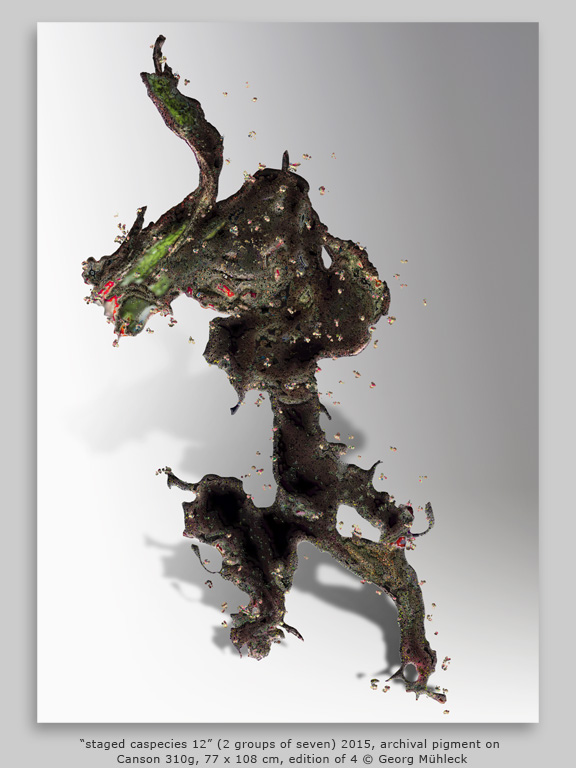caspecies [2014-2015]
“CASPECIES”
The word CASPECIES consists of Cellular Automata and SPECIES.
These species are organisms comprised of algorithms.
Das Wort CASPECIES ist eine Wortfindung aus Cellular Automata und SPECIES. Diese Spezies sind Organismen, entstanden aus Algorithmen.
caspecies (Deutsch/English) PDF text 80KB
“staged caspecies 12” (2 groups of seven) 2015, archival pigment on Canson 310g, 77 x 108 cm, edition of 4 © Georg Mühleck

The word “CASPECIES” consists of Cellular Automata and SPECIES. These species are organisms comprised of Cellular Automatas. They nourish of algorithms. In the process of creation, cell cultures go through hundreds to thousands of generations before they freeze into a large artificial micro-still. Rather than simulating real life, caspecies evoke the possibility of creatures of yet unknown origin and scale. Wanted or not, they might be the result of some genetic research, possibly escaped from petri dishes. Are these ‘mind species’ only — labyrinths of thought, or a Garden of Eden? How will we define nature in the future, with all the by-products of human interference? Is genetic manipulation part of evolution or is it its destruction? Fernando Pessoa writes in his ‘book of disquiet’: “I don’t know if we once were other beings, whose greater completeness we sense only incompletely today, being mere shadows of what they were, beings that have lost their solidity in our feeble two-dimensional imaginings of them amongst the shadows we inhabit.” (Georg Mühleck) Das Wort “CASPECIES” ist eine Wortfindung aus ‘Cellular Automata’ und SPECIES. Diese Spezies sind Organismen, die aus zellularen Automaten entstanden sind. Sie ernähren sich von Algorithmen. Während der Entstehung durchlaufen Zellkulturen hunderte oder tausende von Generationen, bevor sie zum künstlichen Mikro-Stilleben erstarren. Statt natürliches Leben zu simulieren, ruft ‘caspecies’ die Möglichkeit von Kreaturen bisher unbekannten Ursprungs und unbekannter Dimension hervor. Gewollt oder ungewollt mögen diese Kreaturen das Resultat genetischer Forschung sein, vielleicht aus der Petrischale entwichen. Sind dies nur ‘Gehirn-Spezies’ — Gedankenlabyrinthe, oder ein Garten Eden? Wie werden wir Natur, mit all den Nebeneffekten menschlicher Einmischung, in der Zukunft definieren? Ist genetische Manipulation ein Teil von Evolution, oder ist sie dessen Destruktion? Fernando Pessoa schreibt in seinem ‘Buch der Unruhe’: “Ich weiß nicht, ob es andere Wesen gegeben hat, die wir einmal waren, deren größere Vollständigkeit wir heute fühlen, da wir nur noch ihre Schatten sind — sie haben ihre Festigkeit eingebüßt, und wir können sie uns schlecht vorstellen in der Zweidimensionalität des von uns gelebten Schattens”. (Georg Mühleck)
